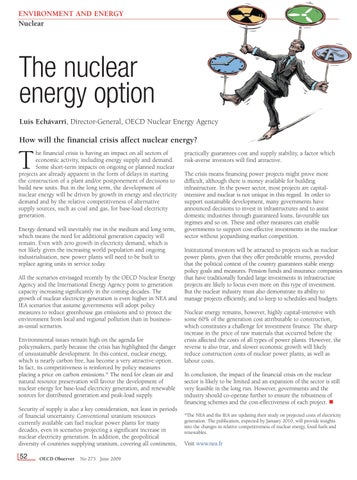ENVIRONMENT AND ENERGY Nuclear
The nuclear energy option Luis Echávarri, Director-General, OECD Nuclear Energy Agency
How will the financial crisis affect nuclear energy?
T
he financial crisis is having an impact on all sectors of economic activity, including energy supply and demand. Some short-term impacts on ongoing or planned nuclear projects are already apparent in the form of delays in starting the construction of a plant and/or postponement of decisions to build new units. But in the long term, the development of nuclear energy will be driven by growth in energy and electricity demand and by the relative competitiveness of alternative supply sources, such as coal and gas, for base-load electricity generation.
Energy demand will inevitably rise in the medium and long term, which means the need for additional generation capacity will remain. Even with zero growth in electricity demand, which is not likely given the increasing world population and ongoing industrialisation, new power plants will need to be built to replace ageing units in service today. All the scenarios envisaged recently by the OECD Nuclear Energy Agency and the International Energy Agency point to generation capacity increasing significantly in the coming decades. The growth of nuclear electricity generation is even higher in NEA and IEA scenarios that assume governments will adopt policy measures to reduce greenhouse gas emissions and to protect the environment from local and regional pollution than in businessas-usual scenarios. Environmental issues remain high on the agenda for policymakers, partly because the crisis has highlighted the danger of unsustainable development. In this context, nuclear energy, which is nearly carbon free, has become a very attractive option. In fact, its competitiveness is reinforced by policy measures placing a price on carbon emissions.* The need for clean air and natural resource preservation will favour the development of nuclear energy for base-load electricity generation, and renewable sources for distributed generation and peak-load supply. Security of supply is also a key consideration, not least in periods of financial uncertainty. Conventional uranium resources currently available can fuel nuclear power plants for many decades, even in scenarios projecting a significant increase in nuclear electricity generation. In addition, the geopolitical diversity of countries supplying uranium, covering all continents,
52
OECD Observer
No 273 June 2009
practically guarantees cost and supply stability, a factor which risk-averse investors will find attractive. The crisis means financing power projects might prove more difficult, although there is money available for building infrastructure. In the power sector, most projects are capitalintensive and nuclear is not unique in this regard. In order to support sustainable development, many governments have announced decisions to invest in infrastructures and to assist domestic industries through guaranteed loans, favourable tax regimes and so on. These and other measures can enable governments to support cost-effective investments in the nuclear sector without jeopardising market competition. Institutional investors will be attracted to projects such as nuclear power plants, given that they offer predictable returns, provided that the political context of the country guarantees stable energy policy goals and measures. Pension funds and insurance companies that have traditionally funded large investments in infrastructure projects are likely to focus even more on this type of investment. But the nuclear industry must also demonstrate its ability to manage projects efficiently, and to keep to schedules and budgets. Nuclear energy remains, however, highly capital-intensive with some 60% of the generation cost attributable to construction, which constitutes a challenge for investment finance. The sharp increase in the price of raw materials that occurred before the crisis affected the costs of all types of power plants. However, the reverse is also true, and slower economic growth will likely reduce construction costs of nuclear power plants, as well as labour costs. In conclusion, the impact of the financial crisis on the nuclear sector is likely to be limited and an expansion of the sector is still very feasible in the long run. However, governments and the industry should co-operate further to ensure the robustness of financing schemes and the cost-effectiveness of each project. n *The NEA and the IEA are updating their study on projected costs of electricity generation. The publication, expected by January 2010, will provide insights into the changes in relative competitiveness of nuclear energy, fossil fuels and renewables.
Visit www.nea.fr























